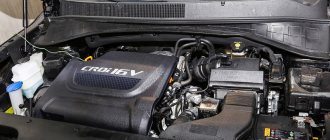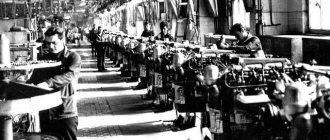Diesel Rudolph - Biography
Rudolf Christian Karl Diesel (German: Rúdolf Chrístian Karl Diésel; March 18, 1858, Paris - September 29, 1913, English Channel) - German engineer and inventor, creator of the diesel engine.
Born in Paris into a German family of bookbinders. During the Franco-Prussian War, he moved to England with his family. In the same year he went to study in Germany. He graduated from the real school (1873) and the Augsburg Polytechnic School (1875) as the best student. Afterwards he was invited to the Munich Higher Technical School, which he graduated from in 1880, passing the final exams with the best results since the beginning of its existence.
On February 27, 1892, Diesel applies for a patent for a “new rational heat engine.” Which he received at the Imperial Patent Office in Berlin on February 23, 1893 under the title “Method and apparatus for converting high temperature into work” (registered February 28, 1892). The second patent with a modified Carnot cycle was registered on November 29, 1893.
Since 1893, development of a new engine was carried out at the Augsburg Engineering Plant (from 1904 MAN) with the financial participation of the companies of Friedrich Krupp and the Sulzer Brothers Ltd. The first functioning engine was created by Diesel there in 1897. The engine power was 20 hp. With. at 172 rpm, efficiency 26.2% and weighing five tons. This was far superior to the existing 20% efficient Otto engines and 12% efficient marine steam turbines and attracted immediate industry interest. The Diesel engine immediately found application and was appreciated in many countries. But in his homeland, R. Diesel did not find recognition and took it hard.
The Diesel engine was four-stroke. The inventor found that the efficiency of an internal combustion engine increases by increasing the compression ratio of the combustible mixture. But it is impossible to compress the combustible mixture too much, because then the pressure and temperature increase and it spontaneously ignites ahead of time. And Diesel decided to compress not the combustible mixture, but clean air. Towards the end of the air compression, liquid fuel was gradually injected into the cylinder under strong pressure. Since the temperature of the compressed air reached 600-650 °C, the fuel spontaneously ignited, and the gases, expanding, moved the piston. Thus, Diesel managed to significantly increase engine efficiency. In addition, there was no need for an ignition system, and instead of a carburetor, a fuel pump worked.
On January 1, 1898, Diesel opened his own plant for the production of diesel engines. In the autumn of 1900, a company was registered in London for these purposes. The first ship with a diesel engine was built in 1903. In 1908, the first small diesel engine, the first truck and the first locomotive powered by a diesel engine were built. In 1936, a passenger car with a diesel engine (Mercedes-Benz 260D) was launched into production for the first time. It was developed by . Numerous patent lawsuits undermined the health of Rudolf Diesel. He was treated at the Neuwittelsbach sanatorium (Munich) (German: Neuwittelsbach). In addition, the financial state of his affairs was unsatisfactory - Diesel was not a good businessman. And the financial crisis of 1913 led to its complete bankruptcy.
On September 29, 1913, Rudolf Diesel set sail from Antwerp on board the ferry Dresden to London to attend the opening of a new plant from one of the companies that produced engines of his design. He seemed to be in good spirits, however, after going to his cabin in the evening, no one saw him again. A few weeks later, German fishermen presented for identification two rings taken from the body of a well-dressed man found at sea. According to maritime custom, the body was left in the water. Rudolf Diesel's son identified the rings as belonging to his father. Versions have been put forward about Diesel's suicide or murder. The exact circumstances of the death were never clarified.











